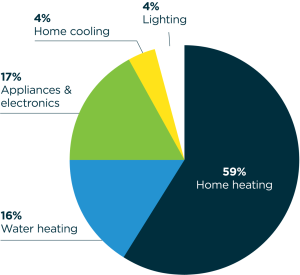WHAT FACTORS AFFECT A HOME’S ENERGY CONSUMPTION?
Just like every household is a little bit different, every home uses energy a little differently. There are some factors we can control (like what temperature we set our thermostats to), and others we can't (like the age of your home).
One way you can help your students draw connections between your lessons and their own lives is to help them understand and reflect on how energy is used in their own homes. Use the classroom-ready resources below to help you get the conversation started.
ENERGY CONSUMPTION: THE BIG PICTURE
To help your students understand their own energy usage, try taking a step back and provide them with more context. Start the conversation with your students by looking at how the average Manitoban consumes energy.
Data from the Natural Resources Canada (NRCan) National Energy Use Database tells us that this is how the average Manitoba household uses energy:

Wow! That means that approximately 75% of monthly energy bills go toward home and water heating. So when you're brainstorming ways to save energy at home with your class, it's a good idea to start by focusing on factors that affect how much heat they're using.
WHAT AFFECTS A HOME'S ENERGY CONSUMPTION?
While there are many factors that impact a home's energy consumption, not all of them are in our control. Some of these factors include the following:
- The age of our home. Older homes tend to have less insulation and other energy-efficient features, meaning they often use more energy.
- The size of our home. Larger homes have more area to heat and often have more electronics and appliances.
- The size of your family. How many people do you have in your home? People consume energy all the time, whether they're showering, watching TV, or boiling a kettle of water. More people means more energy used.
On the other hand, our individual behaviours can also impact our energy use. Some of these factors include the following:
- Thermostat settings. Turning down the heat by at least 3°C when you leave for the day or while you sleep is a great way to reduce your home's energy use.
- Hobbies. Many activities we like to do in our free time, like watching TV, playing video games, and spending time on the computer, use energy.
- Habits Do you turn off the lights when you leave a room and unplug appliances you aren't using? All these little habits can add up to big energy savings.
CLASSROOM DISCUSSION
Start a discussion with your students about how they can be more energy efficient. Frame it from a place of empowerment; even though there are some factors they can't control, there are many they can!
Are you a high school teacher and want to take this lesson to the next level? Have your students complete our Home Energy Review activity! This virtual home audit will help them take the practical knowledge they've learned and apply it to their own home by identifying where their families can make improvements and reduce their energy use.
Email us at hello@generation-e.ca to receive a classroom kit and get started!
